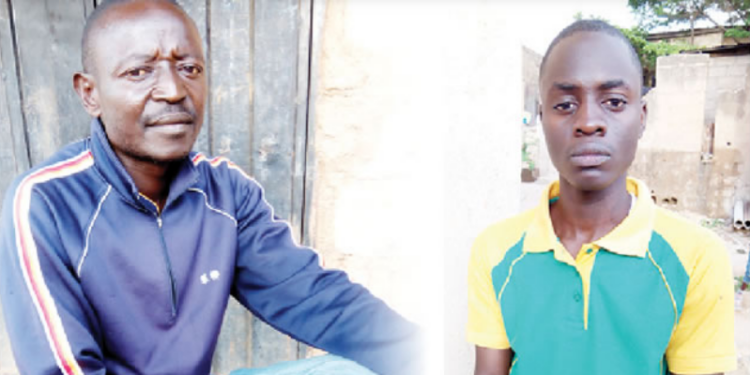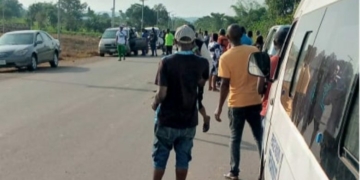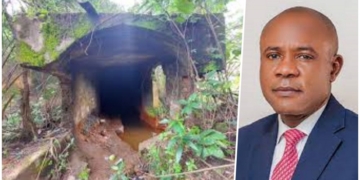Sundays in Jos, Plateau State are generally seen as peaceful and a time to rest and prepare for a new week. For Christians, there is the added advantage of being a time to jointly commune with God at various places of worship. But if many residents of Yan Trailer Fudawa, Dutse Uku, Cele Bridge, Rikkos, among other communities in Jos North Local Government Area of the state could turn back the hands of time, they would make sure the last Sunday (May 26, 2019) did not come.
By the evening of the fateful Sunday, more than five people had been confirmed dead and over twelve houses burnt down following the latest crisis that engulfed the Jos communities. Although the crisis has been brought under control by security operatives deployed in the affected communities, those who survived the cruelty at the hands of fellow humans are still nursing their injuries and counting their losses.
“I’ve never seen a thing like this before. I’m deeply traumatised by the experience,” said 21-year-old Nandom Monday, a 400 level Building student of the University of Jos, whose father was allegedly shot dead by soldiers during the recent hostilities.
Nandom, the third in a family of five, was still in shock when our correspondent visited their family house at Yan Trailer Fudawa on Monday.
Recounting how the life of his father, a retired soldier was cut short, he said, “On that Sunday, around 2pm, we were all together in the compound – my father, younger sister and one of my friends. We had just returned from church because we were told in church not to go anywhere because there was tension in town.
“We were standing on a rock in front of the house, watching the smouldering from houses being burnt by perpetrators of violence far from our house. Some other people were also standing by the roadside, watching the scene and wondering what could make some people start burning other people’s houses. Then suddenly, we saw people running in different directions. We didn’t know that the confusion was caused by some soldiers approaching on motorbikes. When the soldiers got to a filling station close to our house, they stopped a man riding a tricycle.
“They ordered the man to get down and we could see the man begging the soldiers to allow him to go. Before the soldiers could finish with the man, my father, on sensing danger, asked us to get down from the rock and return to the house.
“We didn’t know the soldiers had seen us too. So we started going down but my father was the last person behind. The next thing we heard was a gunshot. One of the soldiers shot at him and the bullet hit him in the chest. He fell down and was calling my name – Nandom, Nandom. He asked me to come. I wanted to go up to where he was lying down but the soldiers fired another gunshot because they saw that somebody was coming. My mother had to call me to come back, which I did.
“Another guy who thought the soldiers had left after shooting my father tried to go up again to assist my father, but was forced to return after the soldiers fired the third gunshot. So that was how my dad was left there while he bled from his bullet wound because everybody was afraid of being shot by the soldiers. Before the soldiers could leave the place, my father had lost so much blood from the wound. I watched helplessly as my father bled to death.
“When we noticed that the soldiers had left, we immediately put him in a car and took him straight to the Jos University Teaching Hospital but the doctors at the emergency unit pronounced him dead on arrival. That was how we lost my father and he is still at the mortuary.
“His death will seriously affect us because he is the one paying our school fees. How I wish he was still alive. My mother has been down with illness for the past 12 years and my father has been the one catering for her, especially as regards buying drugs and other things. She goes to the hospital every two weeks for medical check-up. For survival, we are all depending on his pension as a retired soldier. So with the incident, we really don’t know what to do because even now, my mum does not know where to get money to buy her drugs. Just recently, he went to get our school fees because my younger brother and I are still in the university.”
Forty-one-year-old Ibrahim Haruna Dachung, who lives close to the Mondays, was also not lucky; his younger brother, Daniel, 38, was equally shot dead by the alleged soldiers during the mayhem. Sympathisers, who gathered around the wife and the two children left behind by the late Daniel, were seen bemoaning the situation when our correspondent visited the neighbourhood during the week.
Narrating how his brother died, Dachung said, “On Sunday, I was woken up by a noise outside around 1pm. When I stepped out, I saw smoke everywhere and from what people were saying, I realised that there was trouble in the town. I left for the place where the smoke was coming from. I met some people when I got there and even joined them to put out the fire in some of the houses said to have been set ablaze by some Hausa guys.
“I also saw my younger brother there helping to douse the fire and advised him to be very careful. After that, I left the place. On my way back home, I met some soldiers at Tina Junction, who were driving people away so I ran back to my house. A few minutes later, someone called me to say that my brother and some other people had been shot by soldiers and that he had been taken to JUTH.
“When we got to the hospital, I saw seven dead bodies lying on the ground, including my brother, Daniel Haruna. He was a carpenter; he worked on that house nearby on Saturday and was killed on Sunday. He was 38 years old and married with two children. All the seven dead bodies I saw at the hospital were shot in the stomach. It was really an unfortunate incident.”
According to the village head of the Yan Trailer Fudawa community, Peter Lobwai Yan, there was no justification for last Sunday’s violence in Jos.
He said, “All we hear is that a boy went to have a haircut at Rikkos and was slashed to death. Some youths went there to find out what happened and the trouble started from there. For now, we don’t know the exact number of people that have died but I can tell you that so many people were killed during the violence. Even since the incident occurred, I have not seen my grandson, Geofrey Sunday. So many people were also arrested by soldiers, including women.
“I don’t know what has happened to Sunday; I don’t know if he is dead or alive. The situation is really a difficult one for us because as the village head of this community, I have been crying over our experience as regards insecurity.
“Our people are helpless. We don’t have anybody to help us except God. We are crying because all the people we have chosen to lead us have failed to come to our aid, even to see how we are doing at this terrible period. We have taken all the reports to God and we believe He will fight the battle for us since it appears that we have been abandoned by our leaders.”
A group, Arewa Christians and Indigenous Pastors Association, had on Monday said about 30 persons were killed and 20 houses burnt by suspected Islamic fundamentalists during attacks on some churches and areas inhabited by Christians in Jos on Sunday.
According to the organisation, the attacks confirmed the planned “Fulanisation and Islamisation” of Nigeria, which ex-President Olusegun Obasanjo; a former minister of defence, Lt.-Gen. Theophilus Danjuma, and other ethnic nationalities had warned about.
“The purported executive order signed by Mr President revoking all firearms licences with effect from June 1, 2019 is largely seen as a ploy to disarm Christians and minority tribes to the advantage of the Fulani militias and terrorists,” ACIPA had stated.
The National Chairman of ACIPA, Rev. Luke Shehu, in the statement, said, “The attacks on Christians in Jos on Sunday, May 26, 2019 during church worship are a sacrilege and unimaginable to be carried out in the month of Ramadan.
“Despite the intervention of security operatives in less than 12 hours, about 30 Christians were killed and over 20 houses were burnt or destroyed by Muslim militia, some in military uniforms from around Tina junction, Cele Bridge, Dutse Uku and Nasarawa areas, all bordering Muslim communities in Jos North.”
However, the Plateau State Police Command has said that five persons lost their lives and 12 houses were set ablaze in the crisis. It said the crisis followed the discovery of a corpse between Anguwan Damisa and Dutse-Uku.
According to the police, the discovery of the corpse sparked a riot that engulfed parts of Rikkos, Cele-Bridge, Tina Junction and Anguwan Rukuba in Jos North.
The state’s Police Public Relations Officer, DSP Tyopev Terna, stated that the state police command had on Sunday received a report from one Sarki Arum of Tina area that one Enoch Monday of Tina was seen lying motionless at an area between Dutse Uku and Angwan Damisa in Jos North. According to him, the Command had immediately mobilised policemen to the area and taken the body to Plateau Specialist Hospital, where Enoch was confirmed dead and the corpse deposited at the mortuary of the same hospital.
Terna further stated that some youths in the area had protested when they heard about Enoch’s death following which policemen were deployed in the area.
“The Area Commander, Jos Metro, had mobilised personnel of the divisions within his jurisdiction and moved with the Commanding Officer of 8PMF and the Divisional Police Officer of Nasarawa Gwong Division under whose jurisdiction the crime was committed to the scene of the crime.
“With the efforts of the Area Commander, Jos Metro; the Commander of Operation Safe Haven; the Commanding Officer (8PMF) and the Divisional Police Officer, Nasarawa Gwong Division, the situation has been brought under control. The area is being patrolled (by security operatives). Residents of the area are enjoined to remain calm,” he said, adding that efforts were being made to arrest both the people involved in the protest and the killers of Enoch.






Discussion about this post